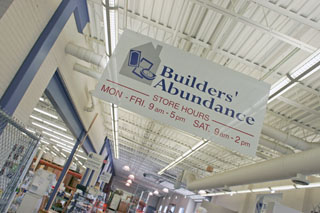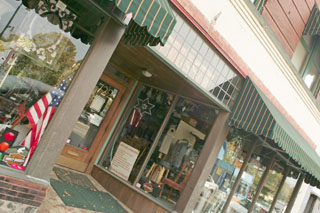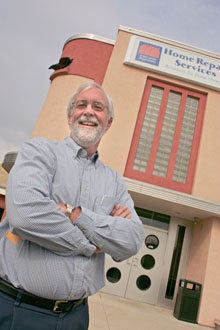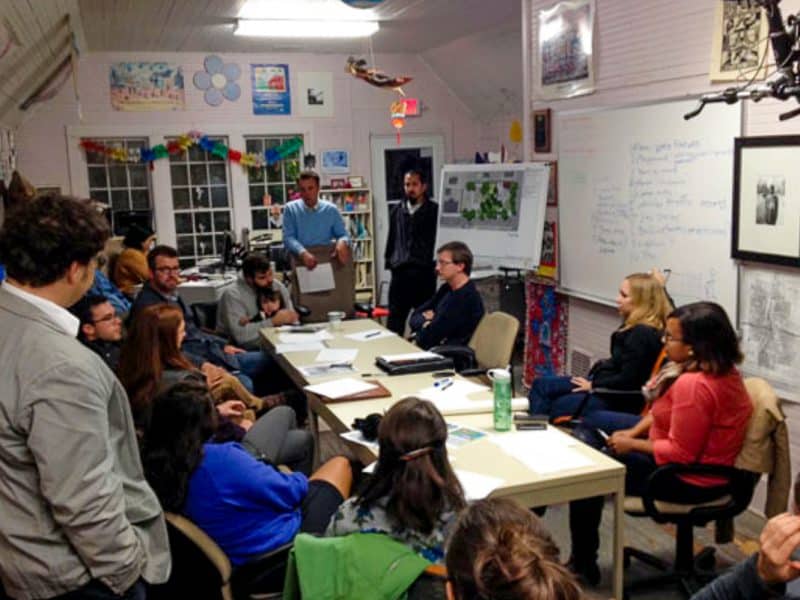Draggin’ Stuff Home
They’re not World Market or Ikea, but the local thrift shops and salvage yards carry interesting items for the home decorator at a fraction of the cost.
During the Depression, it wasn’t necessarily cool or environmentally correct to salvage basic household items – it was how some people survived. Decades later, the idea of recycling and reusing unwanted stuff is still at work, if for different reasons. Building, remodeling and rehabbing homes gives all involved, from businesses to individuals, the opportunity to benefit from making old things new again.
Linda Berglund, a self-described “big thrift-shopper” traveled to ReStore, located at 5701 South Division, when it came time to remodel her home. Habitat for Humanity Kent County operates the store and offers “new and gently used” home improvement materials, fixtures, appliances, and furniture for purchase at prices 50-70 percent below typical retail rates. Shopping there makes sense economically and environmentally to Berglund.
“If you’re on a budget, you can still fix up your home or do repairs,” she said. “And there’s less stuff to go into the landfills.”
Berglund and her husband purchased 60 sq. ft. of ceramic tile for $20, a closet organizer, paint for the kitchen, trim molding, a light fixture, caulk, and other materials for their home.
“If you go frequently, you can find some unique items,” Berglund said, noting a ceramic-top stove she once found.
Seeing a New Purpose Builders, corporations, and individuals generally donate the products ReStore sells. Metro Health, formerly Metropolitan Hospital, is one of them. Most of what the company contributes typically is not unique. But it’s not garbage either. There is a market for the unwanted items and donors like Metro Health help ReStore supply it.
Builders, corporations, and individuals generally donate the products ReStore sells. Metro Health, formerly Metropolitan Hospital, is one of them. Most of what the company contributes typically is not unique. But it’s not garbage either. There is a market for the unwanted items and donors like Metro Health help ReStore supply it.
“We have ReStore come out at least every other month,” said John Ebers, sustainability officer at Metro Health. “They look through what we have set aside, including file cabinets, furniture and construction materials we no longer have a use for. They take away what they can use. I can give them a call on Monday; they’ll be here on Friday.”
By partnering with ReStore, Metro Health enables tons of re-useable materials to find new life – often saving people money and conserving resources through recycling. “We think this is a better alternative to throwing things in a landfill or an incinerator,” Ebers said.
Jane Lockwood, owner of Peaches Bed and Breakfast in Heritage Hill, agrees. Lockwood said her family has embraced the reuse, renew, recycle philosophy since “way before the first Earth Day.”
A self-described “boulevard bargain hunter,” Lockwood has picked up off the streets numerous accessories and accent pieces for her B&B. Chairs, tables, window frames, and glass … “we will take pretty much anything home, put it back together, and keep it or donate it.”
Doing it Right
Lockwood said that while some of the items she finds need repair, many times they just have a minor ding or need a paint job. “There are an awful lot of people who can’t see past the one thing,” she said.
When it comes to period pieces, however, such as time-specific doorknobs, light fixtures, or door locks, Lockwood wants the real thing. As she puts it, “Some things can not be bought new.” That’s when she visits Phil’s Stuff at 722 Wealthy SE.
 Proprietor Phil Ondersma provides what he calls the purist form of recycling. “I’ve dragged stuff home all my life,” he said. Now that “stuff” is available to whoever needs it at what most would consider bargain prices.
Proprietor Phil Ondersma provides what he calls the purist form of recycling. “I’ve dragged stuff home all my life,” he said. Now that “stuff” is available to whoever needs it at what most would consider bargain prices.
“We had one lady who came in and found a prism that she’d been looking for for five years,” Ondersma said. “It cost her $4.00.”
Much of what Ondersma stocks is salvaged from the years when Grand Rapids was demolishing its older homes. Step into his shop and you’ll find thousands of door knobs, hundreds of locks, glass shades for lights, door hinges, porch posts, register covers, wood trim … even pickle barrel lumber.
As people move back into the older city neighborhoods, Ondersma is finding that more and more property owners “want to do it right” as they rehab their homes. This means they also tend to pay more attention to reusing existing materials, such as windows and cabinetry, recycling what they cannot use, or donating it.
How and Why
Mike Wierstra, chair of the Remodelors Council, part of the Home and Building Association of Greater Grand Rapids, sees an increase in remodeling projects across the Grand Rapids area. That, he said, is fueling demand for old household items.
“People are more apt to stay put and willing to expend quite a bit more in sweat equity when it comes to remodeling,” said Wierstra, who also manages the remodeling department at Nugent Builders, Inc. The company encourages its customers to donate any of the unwanted but reusable items from their remodeling project to Builders’ Abundance, a division of the nonprofit Home Repair Services.
The average income of Builders’ Abundance customers is $25,000 per family. Most all are homeowners and, just like their counterparts at other income levels, many are do-it-yourselfers. Builders’ Abundance is their source for affordable building materials.
 “What makes this work are the donations we receive from our partners in the home building industry,” said David Jacob, executive director of Home Repair Services. “Our best suppliers are retailers and wholesalers who supply builders.”
“What makes this work are the donations we receive from our partners in the home building industry,” said David Jacob, executive director of Home Repair Services. “Our best suppliers are retailers and wholesalers who supply builders.”
Unfortunately, with the decline in new home building, those donations have diminished. However, remodelors and recyclers are working to pick up the slack. “Homeowners and individuals who have a passion for our work have continued to give – one kitchen sink, one room of carpet at a time,” Jacob said.
Thinking of remodeling a home or work space? Here are a few tips for getting started:
- If new to remodeling, use the Home and Building Association to find a good designer or remodelor. Get a copy of the Remodelors Council roster of recommended contractors and interview a few.
- Do your homework. Plan your project in such a way where you can reuse or re-purpose what you already have
- Make a wish list of what you want to keep. Keep an open mind for alternative uses
- Check out surplus stores for unique items
Keep in mind that, whether an organization or an individual, by reusing and recycling, you:
- Avoid disposal costs,
- Help minimize landfill dumping
- Provide a “boost” to resourceful, creative homeowners
- May be eligible for a tax deduction
Not bad benefits if you think that, at the same time, you are helping to dress up the look of your space, strengthen neighborhoods, and establish a more sustainable place to live.
Photographs by Brian Kelly – All Rights Reserved
Images:
Pre-loved sinks wait for a new home at Home Repair Services
The Builders Abundance store at Home Repair Services
Phil’s Stuff exterior
David Jacob, Executive Director of Home Repair Services








